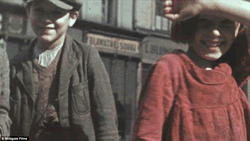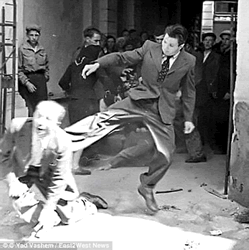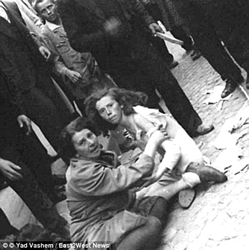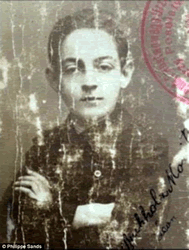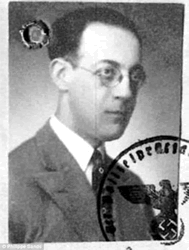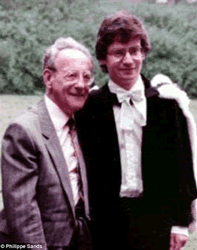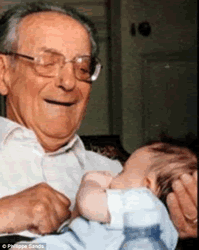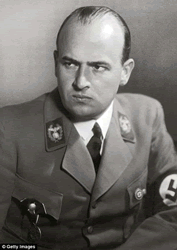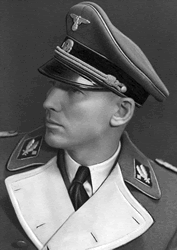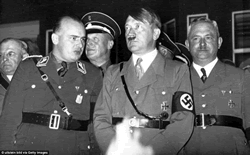Many members of Philippe Sand's family perished in the Holocaust
http://www.dailymail.co.uk/news/article-3305489/My-Nazi-legacy-two-sons-Hitler-s-trusted- His maternal grandfather Leon Buchholz was struggling to survive the war.
He was born in the city of Lemberg - today known as Lviv - in 1904, when it was part of the Austro-Hungarian empire.
When the Nazis marched into the city in 1941, it was the equivalent of a death warrant for the members of his family who were still there.
Rounded up: Frank and Wächter were in power when the Nazis began to round up the Jews in Poland and put them into the ghettos, like these children captured in Frank's home video from the early 1940s
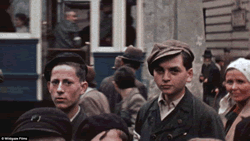
Extermination: Later, they would sign the warrants to send these same people to their deaths in the camps
A Jewish man is kicked to the ground during a pogrom in the Ukrainian city of Lviv in 1941 (left). Philippe's grandfather Leon Buchholz was born in the very same city in 1904, and most of his family were still there. His relatives will have been subjected to beatings and humiliation, like these women, before finally being marched out of the city to be shot (right)
By July that year, with the area under the control of Hans Frank and Otto von Wachter, every member of his family in and around the city was dead.
Leon was lucky - he was the only member of his once 80-strong family still alive by 1944. How he survived was discovered by Philippe only recently, a feat he is keeping underwraps until he releases a book next year.
Still, it takes an amazing sense of forgiveness to visit the very place where the mass-murder of his family took place with the sons of the men who - at the very least - endorsed the killings.
'They didn't sign death warrants so much as oversee the administration of territory in which millions were murdered, including members of my own family,' acknowledged Philippe.
But to stand on the grave of his family with the two men was a strange, and at times upsetting. experience.
'The feeling? An intense connection with the darkest of times,' he told MailOnline. 'Two degrees of separation, not in a good way.'
Persecuted: Philippe's grandfather Leon Buchholz (as a child, left, and in 1939) was born in Lemberg, now Lviv in Ukraine, in 1904, part of a large Jewish family. By 1941 all who remained in the city had been killed
Against the odds: Leon survived - an amazing tale of survival which his proud grandson, with him, left, is going to reveal in a book next year. Right: Leon with his first great-grandchild in 1995
In My Nazi Legacy, Philippe takes both men to a public forum in the UK and then on to Lviv in Ukraine where Hans Frank once made a famous speech railing against the Jews.
His motive in the Lviv trip was to try to get Horst to acknowledge his father's role in the Holocaust by showing him burned synagogues and mass graves - and then ambushing him with paperwork proving his dad gave the commands for the atrocities.
It is powerful cinema but it failed: Horst repeats the justifications and denials which have allowed him to live with the hope that his father was a good man.
'He believes he was basically a good and decent man who did the right thing,' said Philippe whose efforts to try to make a sea-change in his outlook ultimately fail.
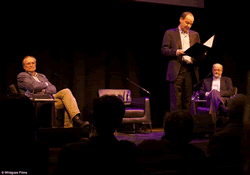
Worlds apart: The three men (left to right Horst, Philippe and Niklas) have been brought together by their shared past, and explored the horror which links them in a critically acclaimed documentary My Nazi Legacy
Philippe calls what passed between all three of them 'a chemistry between us of trust and humanity. The two men who carry their families' stories transmit those stories to future generations.
'Their fathers may be long dead, but the underlying issues that gave rise to these horrors in the first place are all still there.'
The AV Movie Review website called the film a 'tense, blunt documentary, often very dramatic, with confrontations that unfold in front of the camera more or less as they happen. And Evans and Sands get a lot of mileage out of the differences between Von Wächter's and Frank's respective childhoods, noting how the latter's combative relationship with his father may have made it easier to renounce him.'
• My Nazi Legacy is released in the UK on November 20. It has been released as What Our Fathers Did: A Nazi Legacy in the U.S.
Read more:
• MY NAZI LEGACY - OFFICIAL UK TRAILER [HD] - IN CINEMAS NOVEMBER 20 - YouTube
My Nazi legacy: The son who still worships his Nazi father – and Hitler’s godson’s desperate attempts to make him accept the truth
• Niklas Frank is Hitler's godson, and his father Hans was a top Nazi who endorsed the Final Solution - a fact he has struggled with all his life
• Childhood friend Horst von Wachter's father Otto was also a high-ranking official, but he clings to the belief he was a good man who did nothing
• Every member of lawyer Philippe Sands' family living in an area of Ukraine under the control of von Wachter and Frank were slaughtered in the in 1941
• The three have formed an unlikely bond as they delved into their histories
By ALLAN HALL IN BERLIN FOR MAILONLINE
PUBLISHED: 04:49 EST, 6 November 2015 | UPDATED: 09:37 EST, 6 November 2015
Three men bound by the terrible crimes of the Nazis have forged an incredible bond between them that is explored in a moving new film.
Two of the men have fathers who were high-up servants of Hitler and soaked in the blood of the Holocaust. And one of them is a Jew whose family perished because of the berserk racial policies they espoused.
Their stories, and their relationship, coalesces in the acclaimed documentary 'My Nazi Legacy'.
Niklas Frank (left) was one of HItler's closest lieutenants and was hanged for his crimes after he standing trial at Nuremberg. Otto von Wachter (right) survived the war but died in July 1949 after contracting jaundice. He never answered for his crimes
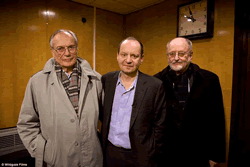
Wachter's son Horst (left) refuses to believe that his father was evil. But despite his unwillingness to accept the truth he has an extraordinary friendship with Frank's son Niklas (right) and Philippe Sands (centre), a British lawyer whose family died in the Holocaust
Sands plays the role of go-between for the two men who approach the Nazi past of their fathers from totally different perspectives. Horst refuses to believe his father, Otto von Wächter, was anything other than a functionary who harmed no-one - and points to the fact that he was never tried to justify his continuing support for him.
Niklas, who was a boyhood friend of Horst's, has spent his whole life punishing himself for who he is and hating his father for what he did.
Sons of evil: Frank, left, was Hitler's right-hand man for many years - even making him godfather to, Nilkas, born six months before the Second World War began
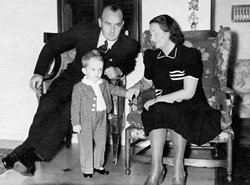
Killer: Frank - pictured with Niklas and his mother Brigitte, dubbed the 'Queen of Poland', in the 1940s - was in charge of occupied Poland during the first couple of years of the war
His father, Hans Frank, was undoubtedly one of the greatest of all Nazi war criminals. As governor-general of occupied Poland in the Second World War, he turned the country into a slaughterhouse.
'If I put up a poster for every seven Poles shot,' he once boasted to a Nazi newspaper correspondent, 'the forests of Poland would not be sufficient to manufacture the paper for those posters.'
When the Final Solution was discussed, he instructed his officers to 'annihilate the Jews wherever we find them and whenever it is possible'.
He robbed, organised mass slave labour round ups, shipped Jews to the death camps and, at war's end, saw the light.
At Nuremberg he famously stated: 'A thousand years will pass and the guilt of Germany will not be erased.'
He was hanged for his war crimes. A witness would later remark Frank - who was noted as one of the only Nazi officials at Nuremberg to show remorse - went to the execution chamber with a smile on his face.
Niklas, who is one of Hitler's godsons, despises his father and described him once as 'a slime-hole of a Hitler fanatic'. He now tours Germany giving speeches about his 'wretched' father and lecturing the young on the dangers of Nazism.
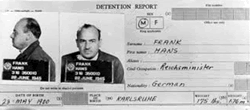
Guilt: Frank saw the light at the end of the war, and told the Nuremberg Trial that it would take Germany '1,000 years' to get over the guilt of what had happened on its command
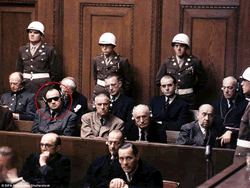
Legacy: For Niklas, dealing with his father's evil deeds - laid bare at the Nuremberg Trials, Frank circled - has taken a lifetime to deal with. He openly admits his father was an hateful Nazi who caused the deaths of millions
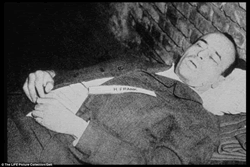
Executed: Frank was executed for his war crimes in October 1946. His son keeps this picture of his dead father in his wallet to remind him of his evil past
Niklas remembers seeing prisoners tormented at a concentration camp as his father chuckled.
'Thin men were mounted on to a wild donkey and the donkey bucked and the men fell off, and they could only pick themselves up again very slowly, and they didn't find it as funny as I did,' he said.
'And again and again they got back on and the donkey was given a slap and again they fell off and they tried to help each other; it was a fantastic afternoon. Then we had cocoa. These are the s****y images I carry around of my father.
'I dream of the piles of corpses in the camps: my country will never be rid of that history. It is a story that is still not over.'
As a permanent reminder, he keeps a photo of his father's body taken after he was hanged in his wallet.
Horst, however, is a man in denial over his father, a man who throughout the movie is cajoled and prodded by his two friends to admit the fact that Otto was probably a war criminal.
'I must find the good in my father. My father was a good man, a liberal who did his best. Others would have been worse,' said Horst.
Otto was a comrade and friend of Hans Frank during the war. The boys met and played as their fathers plotted genocide. Or that is what both Philippe and Niklas believe he was involved in.
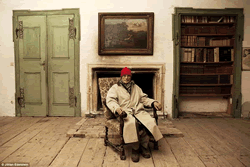
Head in the sand: Horst, pictured in his castle home, has kept hold of family albums which show how closely his parents were tied to the regime - including snaps of Hitler, in amongst shots of children
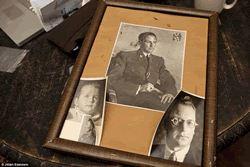
At the heart of the regime: A photograph of von Wächter (centre) with Arthur Seyss-Inquart, right, who led the Occupied Dutch territories, alongside a picture of a baby - possibly one of the von Wachter children
Von Wächter was an Austrian lawyer and Nazi politician and administrative officer. During World War II, he was head of the civil administration in the Krakow and Galicia districts, which is now in Ukraine.
He once signed death warrants for Jews in revenge for the murders of two police officers. He signed a decree ordering the expulsion of 68,000 Krakow Jews and a further one relocating 15,000 to a ghetto - the way station to the death camps.
He was identified as a war criminal as early as 1942 - the New York Times listed him as one of the 'Unholy Ten' Nazis that year, saying his speciality was 'the extermination of the Polish intelligentsia' - but it was Phillipe who confronted his son with solid evidence of his crimes.
In an article he wrote for the Financial Times, Philippe said of his service in Lemberg: 'He would have worked closely with the SS, policing the Jewish ghetto created a few months earlier. Over a period of 18 months, Wächter's administration supported the deportation and murder of just about every Jew in the city and surrounding areas.'
This meant, in effect, shipping the Jews off to the Belzec death camp where 500,000 people were murdered in a little under a year.
But denial has become a central plank of Horst's life in the way that the hatred of Hans Frank has become the dominant theme in Niklas' existence.
'I know that the whole system was criminal and that my father was part of it, but I don't think he was a criminal. He didn't act like a criminal,' says Horst.
'My whole life is dominated by him. Was my father really a criminal?'
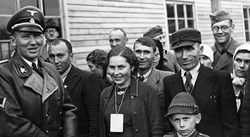
Proof: The New York Times would label Wachter (far left), by now a governor of part of the Ukraine, as one of the 'Unholy 10', saying he specialised in 'the extermination of the Polish intelligentsia' in 1942
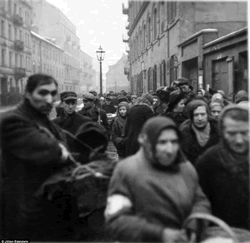
Ghetto: A picture of Warsaw ghetto. The woman in the centre of the image, looking at the camera, may have been Horst's mother Charlotte, Philippe has speculated
He certainly acted like one, fleeing to Rome after the war where he sought out the protection of the notorious German Bishop Alois Hudal, the man who provided the commandant of the Sobibor and Treblinka extermination camps, Franz Stangl, with a Vatican passport so he could flee to Latin America with the ashes of his one million victims lying in the Polish earth.
But there was no such escape for von Wachter. As a result of his daily morning swim in the polluted Tiber, von Wächter contracted jaundice and died in July 1949, never having answered for what were almost certainly monstrous crimes.
Read more: http://www.dailymail.co.uk/news/article-3305489/My-Nazi-legacy-two-sons-Hitler-s-trusted-henchmen-British-lawyer-entire-family-wiped-Holocaust-unlikeliest-friends.html#ixzz3qlsAvmYp
Follow us: @MailOnline on Twitter | DailyMail on Facebook
